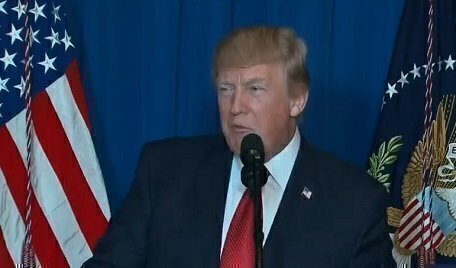President Donald Trump’s constitutional objections to a Russia sanctions bill he signed on Wednesday have raised some old arguments about foreign policy power sharing within the federal government.
 In particular, the Trump legal team has cited two major Supreme Court cases to make a claim that the bill passed by overwhelming margins in the House and Senate has constitutional problems.
In particular, the Trump legal team has cited two major Supreme Court cases to make a claim that the bill passed by overwhelming margins in the House and Senate has constitutional problems.
“In its haste to pass this legislation, the Congress included a number of clearly unconstitutional provisions,” Trump said. “Although I share the policy views of sections 253 and 257, those provisions purport to displace the President's exclusive constitutional authority to recognize foreign governments, including their territorial bounds, in conflict with the Supreme Court's recent decision in Zivotofsky v. Kerry,” the statement argued.
Trump also raised objections about what his legal team sees as a “legislative veto” over his powers to execute certain policy decisions, such as lifting sanctions against Russia. “Certain provisions in section 216, however, conflict with the Supreme Court's decision in INS v. Chadha, because they purport to allow the Congress to extend the review period through procedures that do not satisfy the requirements for changing the law under Article I, section 7 of the Constitution.”
In the end, Trump signed the bill despite his objections, but the constitutional arguments were the subject of some discussion in the aftermath, especially when they apply to economic sanctions.
The ability to levy economic sanctions is one of the oldest political tools in the foreign policy playbook. In an exhaustive history of economic sanctions, Gary Clyde Hufbauer, Jeffrey J. Schott, Kimberly Ann Elliott dug up a very early example from ancient Greece, where Pericles issued economic sanctions against the Megarians. (Aristophanes, the authors said, made fun of the decrees by calling them “laws written like drinking songs.”)
In colonial America, English colonists upset with taxes and trade regulations imposed by the British boycotted official imported goods, such as tea. Early policy under the United States government established by the Constitution blocked trade with Britain and France during various disputes. During the Civil War, the Union used naval blockades against the Confederacy, and similar blockades were important economic sanction tools in both World Wars. During the Cold War era, economic sanctions were used against the Soviet Union, China and North Korea, with President Jimmy Carter’s grain embargo against the Soviets as a prominent example.
The Executive Branch and Congress share powers to shape economic sanctions through laws and policies. The Congressional Research Service described the basic relationship, in the context of North Korea sanctions, back in 2016.
“The U.S. sanctions [against North Korea] are a result of requirements incorporated into U.S. law by Congress, decisions made in the executive branch to exercise discretionary authorities, and obligations placed on member states of the United Nations by the U.N. Security Council,” the CRS said last October in a report. “Though the President, in accordance with the Constitution, leads the way in conducting foreign policy, Congress holds substantial power to shape foreign policy by authorizing and funding programs, advising on appointments, and specifically defining the terms of engagement in accordance with U.S. political and strategic interests.”
The current Russia sanctions were put in place starting in 2014 after Russia’s annexation of Crimea and its involvement in Ukraine. President Barack Obama issued executive orders that stated some sanctions, while Congress passed two acts, signed by President Obama, that listed other sanctions.
The new law limits the President’s ability to use the lifting of sanctions as a foreign policy tool by requiring congressional review and approval. University of Chicago Law School professor Daniel Hemel, writing for Slate, believes the Trump team has several persuasive arguments.
“As the Supreme Court ruled in 1983’s INS v. Chadha, the requirement of the president’s signature or a veto override applies to any legislative act that alters ‘the legal rights, duties, and relations of persons … outside the Legislative Branch,’” Hemel says, arguing that a 12-day waiting period in the law conflicts the Constitution’s Presentment Clause. (Click here to read Hemel’s detailed argument.) Hemel also believes the act’s definition of borders related to the Crimea-Ukraine conflict is a power the belongs to the President under the Court’s 2015 Zivotofsky decision.
But Georgetown Law professor Marty Lederman told the New York Times that the arguments won’t hold weight. “The particular constitutional objections in the signing statement are not groundbreaking or particularly noteworthy — they reflect the likely views of most any administration, including the Obama administration,” Lederman told Charlie Savage on Wednesday. “Those objections are minor and discrete, however. They are unlikely to have any practical effect, and certainly do not make the legislation ‘significantly flawed,’ contrary to what the president stated.”
Another interested party commented on Wednesday. "The Trump administration has shown its total weakness by handing over executive power to Congress in the most humiliating way,” said Russian Prime Minister Dmitry Medvedev on Twitter.
Scott Bomboy is the editor in chief of the National Constitution Center.







